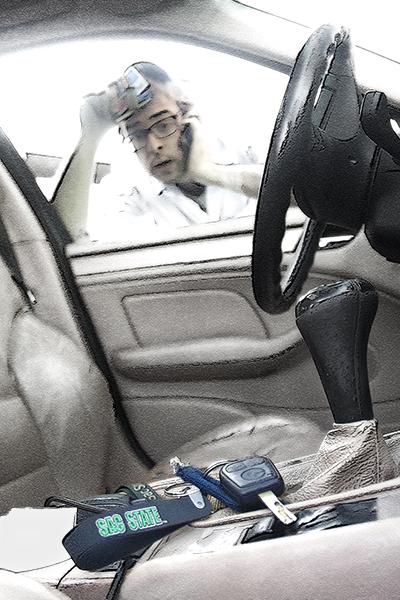University Police officers spend hours assisting students to unlock vehicles

Photo illustration by Amy Voong, Jessica Herrrea, Tyler Bazlen and Sawyer Mahoney.
October 18, 2011
Students, faculty and campus staff forgetfully locking their keys inside their cars has become a frequent occurrence at Sacramento State, according to the Sacramento State Police Department.
In the month of September, there were 54 reports of people locking their keys in their car, according to the University Police Media Log. That number is staying consistent in the month of October, as the first week of that month saw 13 vehicle lockouts on campus.
University Police spokesman Lt. Scott Christian said vehicle lockouts are one of the most frequent calls the department receives.
The first week of school saw 18 vehicle lockouts reported on campus.
“On average, they take less than 10 minutes from time of dispatch until the officer clears the call,” Christian said.
Christian said the 10 minutes includes the travel time, either on foot or by car, to the call.
To put this into perspective, if the average call to a vehicle lockout takes 10 minutes and there are 54 lockouts in a month, 540 minutes (or nine hours) are spent responding to these incidents per month.
Over a span of a single semester, those numbers can be averaged to take up to 40 hours of University Police time responding to vehicle lockouts.
“That is an average work week spent unlocking cars,” said Dirk Hooten, junior business administration major. “I find those numbers extremely high.”
Hooten argues that those hours are too valuable to waste for police officers on campus.
“I understand people need to get into their cars, but call someone else for that,” Hooten said. “Campus police should be using their time more effectively. I know there may not be a lot of crimes on campus, but police officers can be working to improve the community besides spending time unlocking doors. I feel like it’s a huge waste of time for them.”
Some students who have made the mistake of leaving their keys locked in their car think it is a good opportunity for police officers to be more visible on campus as well as help the community.
Victoria Wang, senior business administration major, locked her keys in her car in Parking Structure II, next to the Hornet Bookstore.
“I don’t think it was a waste of time for them,” Wang said.
“Now that there have been a number of sexual assaults on campus and around parking garages, it gives the police a good opportunity to keep a lookout for any crimes.”
Wang also said University Police handled the situation nicely and did not seem irritated or upset they had to respond to such a minor incident.
“I was really embarrassed that I had locked my keys in my car, but the officers were really nice about it and assured me it was not a problem for them to come help me,” Wang said.
Christian said it is University Police’s duty to help anyone on campus.
“Both vehicle and office lockouts are a service that the department provides to make things a little easier for the students, faculty, and staff here on campus,” Christian said.
To have the police there to help out during the day or the middle of the night, it can mean a lot to a person, Wang said.
“I really like that they have the service for free. As a commuter campus, I can only imagine how often that happens to people. I feel the police are very generous to students for such an embarrassing situation,” Wang said.
Lockouts are typically responded to by community service officers first and patrol officers if no community officers are around, Christian said.
Christian said one of the most common times these lockouts occur is during finals and midterms. Spring semester’s finals and midterms saw an average of more than one vehicle lockout per day.
“Vehicle lockouts typically peak around midterm time, when students are preoccupied with studying, midterms, and such,” Christian said.
Wang said students who come to campus to study or take important tests, often think of one thing – their schoolwork. This may push any other priorities (bringing keys with them outside of the car, for example) to the side, she said.
“The one thing (students) come to school for is to do well in class,” Wang said. “If there are important papers or tests they are focusing on, the odds are they aren’t focusing on much else. That can lead to forgetfulness.”
Although keys are a common item to forget, a tip for students to follow in keeping their keys on them at all times is the “Three-Pat Rule,” Hooten said.
“Before I leave my house or my car I always do the ‘three-pat rule,’ where I pat my back pocket to make sure my wallet is there, then my two front pockets for my phone and my keys,” Hooten said. “Works every time.”
Russell Preston can be reached at news@statehornet.com































































































































